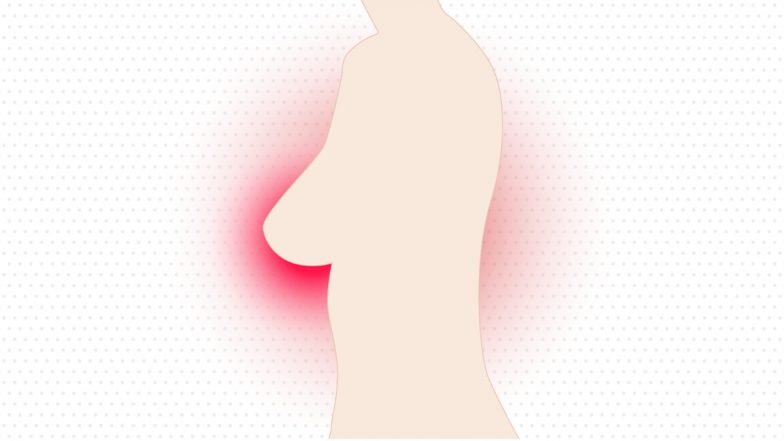Breast Cancer, also called Breast Carcinoma, is a major health concern affecting millions of women worldwide. Understanding its stages, diagnosis, symptoms, and treatment options is crucial for early detection and effective management. Let’s understand breast cancer to raise awareness and support those impacted by this disease. Hina Khan Shares Heartfelt ‘This Too Shall Pass’ Message Amid Support Following Breast Cancer Diagnosis.
Stages of Breast Cancer
Breast cancer is categorised into stages based on the size of the tumour, the involvement of lymph nodes, and the spread to other parts of the body. The stages are as follows:
Stage 0: Also known as carcinoma in situ, this stage indicates non-invasive cancer where abnormal cells are confined to the ducts or lobules in the breast.
Stage I: Early-stage invasive cancer where the tumour is up to 2 cm in diameter and has not spread outside the breast.
Stage II:
Divided into IIA and IIB:
IIA: Tumor is 2-5 cm, or cancer cells are found in 1-3 nearby lymph nodes.
IIB: Tumor is larger than 2 cm but not more than 5 cm, or smaller with lymph node involvement.
Stage III
Divided into IIIA, IIIB, and IIIC:
IIIA: Tumor is larger than 5 cm, or cancer has spread to 4-9 lymph nodes.
IIIB: Cancer has spread to the chest wall or skin of the breast.
IIIC: Cancer has spread to 10 or more lymph nodes.
Stage IV:
Advanced cancer is where the disease has spread to other parts of the body, such as bones, liver, lungs, or brain.
Diagnosis of Breast Cancer
Early detection is vital for successful treatment. The following methods are commonly used to diagnose breast cancer:
Mammography: A low-dose X-ray of the breast is used to detect tumours before they are palpable.
Ultrasound: Uses sound waves to produce images of the breast tissue, helping distinguish between solid masses and fluid-filled cysts.
Magnetic Resonance Imaging (MRI): Uses magnetic fields to create detailed images, particularly useful for high-risk patients and dense breast tissue.
Biopsy: Involves removing a small tissue sample from the suspicious area for examination under a microscope to confirm the presence of cancer cells.
Genetic Testing: Tests for mutations in genes such as BRCA1 and BRCA2 that increase the risk of breast cancer.
Symptoms of Breast Cancer
Awareness of breast cancer symptoms can lead to early diagnosis and treatment. Common symptoms include:
- A lump or thickening in the breast or underarm
- Changes in the size, shape, or appearance of the breast
- Dimpling or puckering of the skin
- Inverted nipple or nipple discharge
- Redness, scaliness, or thickening of the breast skin or nipple
Treatment of Breast Cancer
Treatment options for breast cancer depend on the stage, type, and other individual factors. Common treatments include:
Surgery
Lumpectomy: Removal of the tumour and a small margin of surrounding tissue.
Mastectomy: Removal of the entire breast, sometimes including nearby lymph nodes.
Radiation Therapy: Uses high-energy rays to target and destroy cancer cells, often used after surgery to eliminate remaining cancer cells.
Chemotherapy
Involves using drugs to kill cancer cells, often administered before surgery (neoadjuvant) to shrink tumors or after surgery (adjuvant) to prevent recurrence.
Hormone Therapy
Used for hormone receptor-positive breast cancers, these treatments block hormones that fuel cancer growth.
Targeted Therapy
Involves drugs that target specific characteristics of cancer cells, such as the HER2 protein, to stop their growth.
Immunotherapy
Enhances the body’s immune system to recognise and destroy cancer cells, used in certain types of breast cancer.
Understanding the stages, diagnosis, symptoms, and treatment options for breast cancer is crucial for early detection and effective management. Regular screenings, awareness of symptoms, and advancements in medical treatments provide hope and improved outcomes for those affected by this disease. If you experience any symptoms or have a family history of breast cancer, consult your healthcare provider for appropriate screening and preventive measures.
(This article is written for an informative purpose and should not be substituted for medical advice. Kindly consult your doctor before trying any tips.)
(The above story first appeared on LatestLY on Jun 30, 2024 12:15 PM IST. For more news and updates on politics, world, sports, entertainment and lifestyle, log on to our website latestly.com).







